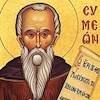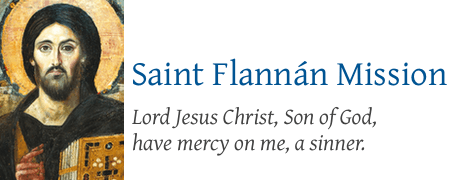 In the Name of the Father and of the Son and of the Holy Spirit, one God. Amen. Dear beloved, we remember the father among the saints, St Symeon the New Theologian, and St Anastasia the Roman today. St Symeon the New, and St Anastasia the Roman, pray for us!
In the Name of the Father and of the Son and of the Holy Spirit, one God. Amen. Dear beloved, we remember the father among the saints, St Symeon the New Theologian, and St Anastasia the Roman today. St Symeon the New, and St Anastasia the Roman, pray for us!
St Anastasia was born in Rome to a privileged household, but became an orphan at the tender age of three. She was received into a women’s monastery in Rome, and eventually was arrested for her faith during the reign of the emperor Decius. The saint was put through great torture and mutilation, with her breasts and tongue cut off, and was eventually beheaded and martyred for her faith.
Holy father among the saints, St Symeon the New (Theologian), was first a monk in the Studite monastery of Constantinople, and later became the abbot of the St Mamas Monastery. Although some would imagine St Symeon the New (Theologian) to be a radical, he was not. Rather, the “New” differentiates him from the earlier St Symeon, and “Theologian” was added to his name after his blessed repose later. St Symeon the New, therefore, stands with the holy fathers St John the Evangelist, and St Gregory of Nazianzus, Archbishop of Constantinople, as a few who were venerated as Theologians.
St Symeon the New was a great spiritual elder who taught us many things, especially that of prayer. Some of his writings were preserved in the Philokalia (Greek for “love for the beautiful), which is one of the foremost texts penned by the holy elders from the 4th to 15th centuries in the hesychastic tradition of the Church.
For us, who humbly walk the path of the hesychasm (Greek for silence and stillness), as taught by our Christ and Lord, to go into the closet and pray (St Matthew 6:6), St Symeon the New offered great illumination to us seeking interior prayer, or the prayer of the heart, “Lord Jesus Christ, Son of God, have mercy on me, a sinner”.
Why seek the interior prayer, much as the unnamed pilgrim in the 19th century Russian Orthodox classic, The Way of a Pilgrim” did?
The first thing we must remember, is that our prayers should draw us ever closer to God, and not merely asking for Divine favors. St Nikolai Velimirovic, beloved Serbian saint once said, “I cense my faith with prayer ceaselessly, lest the scents of the world blind it.”
Our aim, through God’s Mercy and Grace, is to seek theosis, partaking of the Divine Nature, not merely through the Holy Mysteries or sacraments of Holy Communion and others, but also through little steps we make every moment in our lives.
Therefore, prayer, especially interior prayer, is for us to lift our souls up, hoping in the Lord, for us to become ever so slowly, away from our passions and therefore the lures of the evil one, and to be ever so slowly and painstakingly, towards God.
Living our lives daily, therefore, is no mere existence or little actions of unimportance. Living our lives daily is a great battle, not only against the lures of the evil one who attempts to draw us closer to him and therefore away from God, but also, every moment in our lives become a great battle of our interior selves, fighting our own passions and delusions. Put bluntly, we are our worst enemies. Holy father among the saints, the Coptic St Macarius the Great, once said, “the evil one never tires from warring. As long as we live in this world and wear the flesh, the evil one continues to war.”
St Symeon the New said in one of his discourses, “Holy fathers before us have concentrated on one thing, that of guarding the heart, wherefore they were convinced that if the heart is not guarded, no virtue can set foot, and conversely, through the guarding of the heart, all other virtues can be nurtured firmly.”
What is the most important thing then, in guarding our heart against our own delusions and passions, as well as against the snares of the evil one? It is humility, as we reflect on the Wisdom of Sirach 35:17-19. St Issac of Syria admonished us of the same. who said, “even fierce demons of great malice become like dust when they encounter a humble person.”
St Symeon the New taught us 3 prerequisites that are paramount to us acquiring the interior prayer, (1) detachment, (2) conscience, and (3) peace.
If we continue to be plagued by our passions and attachments to the things of this world, material or immaterial, real or imagined, it is difficult for us to seek the path of Christ our Lord. If we are continually pricked by our own passions that exercised their actions causing our conscience to be in turmoil, it is impossible for us to find the stillness for interior prayer. If we war ourselves and others, peace eludes us and we cannot return to ceaseless prayer of the heart.
In all things, are we mindful of our interiors, and then our deeds? If we cannot be mindful of these things, it would be difficult for us to be attentive to our prayers unto God, and in turn, will find our journeys fruitless and meaningless.
God does not ever turn His back to us. It is His Nature to always illumine us with His Mercy, Grace, and Love. God always surround us with His holy angels and saints, whether we are blind to them or not. As we reflect on Baruch 3:1-6, remember that saints departed, and the holy angels of God, pray for us too, just as we pray for others in intercession, and especially our Most Holy beloved Theotokos, our Panagia, who pray for us before her Son and our Christ and Lord.
Therefore, even as we stumble when we attempt to be mindful of our interiors, often failing, often falling, inside and in deeds, remember that God surrounds us with strength and mercy, and we are to hope and pray to Him, and ask our beloved Theotokos, saints, and angels of God, to pray for us too, just as we would ask others around us to pray for us. We pray and ask for prayers, not for our own material gains and comfort, but especially for us to lean ever closer to God and His Ways, and to lend comfort and relieve burdens for others who suffer a great deal more than us.
Beloved, hope and trust in our Lord and Christ, call on His Holy and Mighty Name, “Lord Jesus Christ, Son of God, have mercy on me, a sinner”.
Let us close by praying the thanksgiving prayer:
It is truly meet to call thee blest, the Theotokos, ever blessed and most pure, and the Mother of our God. More honorable than the Cherubim, and more glorious than the Seraphim, without corruption thou gavest birth to God the Word: True Theotokos, we magnify thee.
O virgin Theotokos, rejoice; O Mary full of grace, the Lord is with thee. Blessed art thou among women, and blessed is the fruit of thy womb, for thou hast borne the Savior of our souls, Jesus Christ our Lord. Amen.
Fr Raphael+
Readings
Baruch 3:1-6
Sirach 35:17-19
St Luke 9:7-11
Colossians 1:24-29

